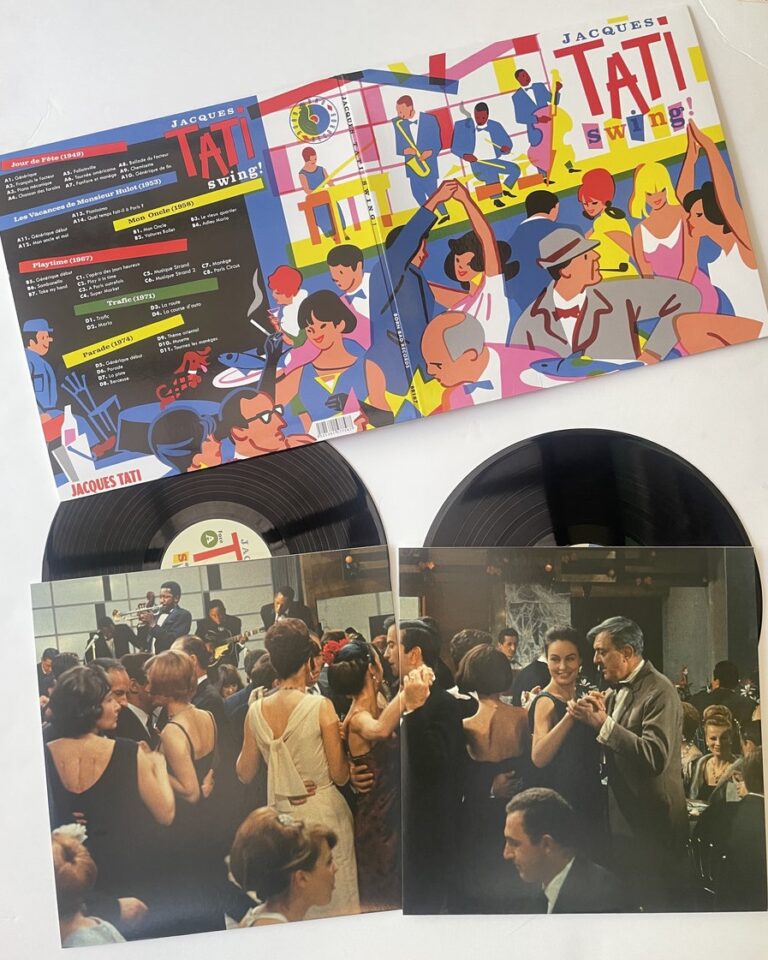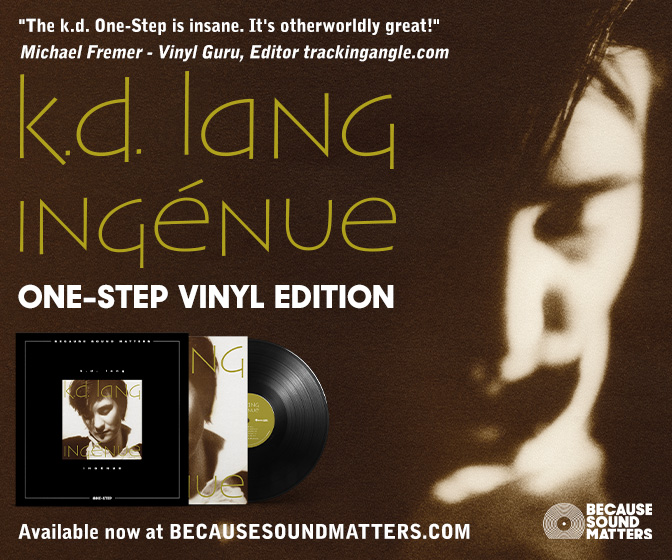"Jacques Tati Swing!" Compilation Marks 70 Years Since Monsieur Hulot's Cinema Debut
A much-needed double vinyl collection of music from Tati's iconic films
The first time I saw a Jacques Tati film, an arthouse cinema showing of 1949's Jour de fête back in the early 2000s, I had the gut feeling that something was wrong. This was the 1995 restoration with its slightly washed-out colors, but that wasn’t it. No, it was how the film sounded. Director and inadvertent protagonist Tati’s approach to the blending of sound and vision meant that he would film and edit everything before constructing and applying a soundtrack of speech and dialogue (typically minimal, almost an instrument in its own right); sound effects (frequently exaggerated and bizarre, often deliberately percussive); and bona fide music (sourced from a series of highly talented French composers). The results were as odd as they were brilliant in their effect. As David Lynch puts it, “If you turned the sound off for a Jacques Tati movie, you’d be losing half of the humor.”
It’s a selection of the musical elements from Tati’s films that forms Swing!, a recent double vinyl compilation on French label Born Bad Records, which has been going since 2006 and has put out a number of recommendable niche titles including the Francis Bebey comps African Electronic Music 1975-1982 and Psychedelic Sanza 1982-1984, the VA set À Moi La Liberté, Early Electronic Raï, Algérie 1983-90, and the delightful grooves of Disque La Rayé - 60’s French West-Indies Boo-Boo-Galoo and Tchic Tchic French Bossa Nova 1963 1974.
Those last two titles were both compiled and produced by Jean-Baptiste Guillot, who is also the mastermind behind this much-needed Tati set. Until now, the only Tati soundtrack compilation on vinyl was the 1968 Philips entry Playtime (Bandes Originales Des Films De Jacques Tati), which despite its A-side emphasis of the music from Playtime, arguably Tati’s defining masterpiece, dedicated its B side to eight tracks from a spread of five other Tati films. Swing! presents a much-expanded selection, beginning with 10 tracks from 1949’s Jour de fête, followed by four cuts from its 1953 follow-up Les Vacances De Monsieur Hulot, and that’s only the first of four sides.
The chronological ordering on Swing! makes a lot of sense (the 1968 compilation’s running order was arbitrary and somewhat illogical) and continues with tracks from Mon Oncle (1958) on side B, which segues into Playtime (1967), represented by a full 11 pieces (the ’68 record only had eight) spilling over onto and covering the whole of side C. Swing! concludes with a D side of four pieces from 1971’s Trafic and seven from Tati’s final film, Parade (1974).
Guillot told me that the material for this compilation was sourced from the original tapes that remain in the possession of the Tati-related Deschamps family, who are the rightsholders. This applies to all but one of the films: out of necessity, the music for Trafic was sourced from a CD released in Japan around 15 years ago. The results speak for themselves, with the buttery sound of analogue tape clear throughout (minus the brief Trafic detour) and the vinyl pressing itself essentially flawless. On most tracks there is air around each instrument, making everything easy to locate in terms of positioning in the mix. The first three sides are in mono, which perhaps enhances this effect.
 Going back to the beginning of side A, the suite from Jour de fête, in which Tati plays a haplessly comical, bicycle-riding provincial postman, finds composer Jean Yatove delivering a series of jolly pastoral motifs on strings, accordion, reeds, vibes. This section is followed by the laid-back Atlantic Ocean breeze of Alain Romans’ memorable theme to Les Vacances De Monsieur Hulot, the third variation of which introduces Django Reinhardt-esque guitar to superb effect in a jazzy number that sets the scene for what’s to follow on side B...
Going back to the beginning of side A, the suite from Jour de fête, in which Tati plays a haplessly comical, bicycle-riding provincial postman, finds composer Jean Yatove delivering a series of jolly pastoral motifs on strings, accordion, reeds, vibes. This section is followed by the laid-back Atlantic Ocean breeze of Alain Romans’ memorable theme to Les Vacances De Monsieur Hulot, the third variation of which introduces Django Reinhardt-esque guitar to superb effect in a jazzy number that sets the scene for what’s to follow on side B...
Here we begin with Franck Barcellini’s lilting theme tune for Mon Oncle, one of several earworms on this compilation, with the kind of melody that you find yourself whistling in the shower. (Incidentally, the first record that Tracking Angle favorite Haruomi Hosono ever bought was the Japanese 7-inch single of Barcellini’s Mon Oncle theme.) This is followed by a series of vignettes that switch from hot jazz to a more sentimental mood and back again before we arrive at the glorious opener to Playtime, by which point (1967), Tati’s films and musical selections are in full swing. Playtime’s opening theme revives the marching drums and clamor of percussion from earlier tracks before resolving into a chorus of angelic backing vocals with sublime production qualities that aren’t too far removed from Pet Sounds, which had been released the previous year. “Sambanella” is another Playtime highlight here, shapeshifting between mambo, cool jazz and samba with very audible Guiro.
Playtime continues on side C, picking up with “L’opéra des jours heureux” – which will indeed make your days happy, its bouncing double bass eventually giving way to orchestral grandiosity and a tempo upswing that works a treat. Next up is a curio in the form of “Play it in Time”. This track, combining manic percussion with upbeat organ stabs, features in Playtime’s famous restaurant scene and was contributed by James Campbell Badiane, a Senegalese actor who appears in said scene as one of a group of jazz musicians providing the background to a sequence that evolves/devolves into pure, ineffable chaos. Voilà, mes amis:
The last side of this set is, I think, a level or two down from the life-affirming brilliance of the preceding three sides, despite (or perhaps because of) the shift from mono to stereo, and more obviously because of the changing times. By now we’re in the 1970s, Tati’s final scene, with two films that are entertaining but not quite up to the standard of his previous works. The music from Trafic has a rockier sound than what came before: although it retains slivers of the Tati vibe, it’s generally jarring and disorientating, with the notable exception of “Maria”, a beautifully chilled two-and-a-half minutes of what could easily be prime High Llamas or Stereolab, with its silky female la-la-la vocals bedded in stage-filling high fidelity. The following Trafic numbers are throwaway, however, and the selection from Parade leaves merely a sepia tone of faded glory.
Swing! is a fine audio document of what makes most of Jacques Tati's oeuvre so special, of how he captured pure joie de vivre and bottled it with the essence of comedy as performance art, and while I’ll probably only be returning to three out of four sides, the sound quality and production values of this compiliation, including sleeve and liner notes (which are appropriately kooky rather than comprehensive), are first-rate. Above all, the music leaves a lasting impression and bears repeated listening. To paraphrase Tati himself, this is music that starts when you turn the record off.










































